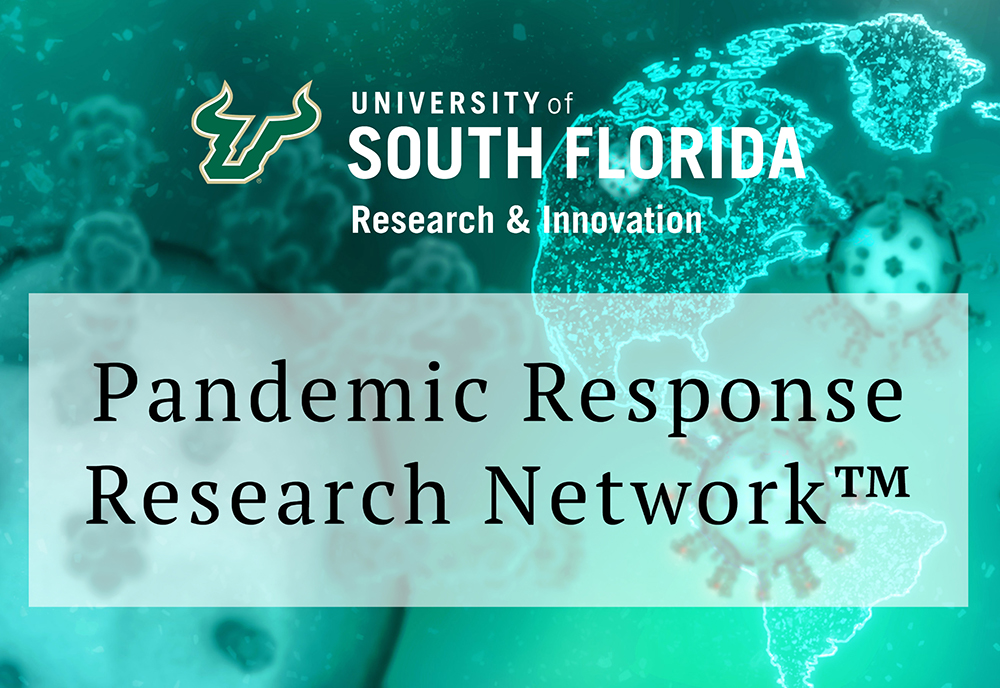Effort will organize and support USF scientists in research to fight current and future pandemics.
TAMPA, Fla. – The University of South Florida is launching the Pandemic Response Research Network™, an interdisciplinary collaboration of its leading scientists whose research addresses the issues surrounding epidemics, and will provide financial seed support for a series of projects aimed at developing potential vaccines, treatments, technologies and social mitigation strategies in the wake of COVID-19.
USF’s Office of Research & Innovation is leading the effort and providing financial support for research and development projects aimed at advancing projects that directly aid in the fight against coronavirus, pandemics and the social and financial havoc created by global outbreaks. The goal of the effort is to quickly scale up projects to seek federal support through the recently passed C.A.R.E.S. Act and other external funding opportunities.
“USF’s fundamental commitment to solving global problems, positively shaping the future, and improving lives clearly resonates with great urgency at this very moment,” Dr. Paul Sanberg, USF's Senior Vice President for Research, Innovation & Knowledge Enterprise. “Fortunately, we are uniquely positioned to leverage our research strengths, scholarly expertise, and extensive experience in collaborating with internal and external partners to quickly respond to the current COVID-19 crisis as well as future pandemics.”
USF faculty have been asked to submit proposals to the USF COVID-19 Rapid Response Grant Program for initial projects by Monday, April 13, 2020.
The Pandemic Response Research Network™ (PRRN) structure is quickly assembling research hubs in key areas of USF research strengths:
Clinical, Translational and Therapeutic Discovery
- Developing data centric approaches to identify regional hotspots for emerging pandemics and generate novel diagnostic and therapeutic strategies needed for infection control and/or treatment;
- Leveraging USF’s close relationship with Tampa General Hospital to develop a regional pandemic response team;
- Utilizing USF’s experience with educational and social science research to determine the best ways to communicate with diverse individuals within communities across the region in times of crises with attention to culture and literacy;
- Building partnerships with local manufacturing and biotechnology companies capable of developing effective strategies to address current and future pandemics.
Environmental Consequences of the COVID-19 Viral Epidemic
- The impact of reduced air traffic and other changed land/sea travel patterns (CO2 emissions, healthy oceans);
- By integrating machine learning with genomics, what can we learn about the public health factors of the zoonotic global animal response;
- Useful information that can be gained through a crowd-sourced approach to health and well-being that can be useful to service agencies including local government;
- The global impact(s) of decreasing pollution globally (financial, public health, attitudinal, policy);
- What we need to do in advance of an active hurricane season (crisis on top of crisis).
Information, Computing, and Communication Technology
- Data infrastructure to support the network, which will involve creating data lakes on the cloud in partnership with USF IT that is secure and stores all the relevant clinical, public health, mobility, and any other relevant datasets that are necessary to model present and future pandemic outbreaks;
- Cloud-based analysis infrastructure, which will involve developing models and methods to generate insights, early warning signals, identifying hotspots, and visualizations using big data technologies;
- Communications and Policy infrastructure, which will involve creating forward-looking simulations and analytical modeling tools with a goal of informing various stakeholders, including policymakers;
- Data Security and Privacy involving vulnerabilities exposed by the virus and the changing nature of work as well as the deployment and use of surveillance mechanisms (including mobile and platform applications and personally identifiable data).
Research Hub on Microbiome, Immunology and Infection Mitigation
- The design of two novel strategies for mitigating COVID-19 and RSV infections through intervention on the gut microbiota: 1) A nutrient-based approach of gut microbiota for mitigating COVID-19; and 2) a nanoparticle system to modulate gut microbiota and mitigate RSV infection.
Behavioral, Socio-emotional, and Educational Wellbeing
- Impact of COVID-19 on psychosocial and physical wellbeing;
- Impact of online education and telehealth;
- Dissemination of information/communication;
- Community services and public policy.
The Task Force is also in the process of creating hubs for basic research toward therapeutics; diagnostics, vaccines and cleaning solutions; epidemiology and surveillance; fundraising and partnerships; and manufacturing, innovation and entrepreneurship.
For more information on USF’s response to the COVID-19 outbreak, visit USF Coronavirus Updates.
